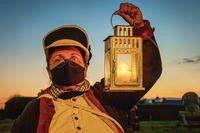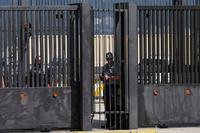No one in the royal family expected much of Prince William Henry. He had two older brothers who were in line for the throne before him, so it looked like he would never get a shot at the crown. He was wrong, but no one knew that when he first visited the American East Coast.
Normally, a member of the royal family visiting the United States would come with a lot of fanfare and hullabaloo. But Prince William Henry visited at a time when the United Colonies were fighting his father, King George III, for their independence. There wasn't a lot of fanfare, but among the rebel leadership, there was a lot of hullabaloo.
Rumors in Gen. George Washington's intelligence circles said that there were times when the prince was lackadaisical and lightly guarded. Washington saw the royal complacency as a means to trade for some of his men in jail. He wanted it so badly, he authorized a kidnapping operation to get the prince.
Unconcerned with having to ascend to the throne one day, Prince William Henry did what a lot of (male) English nobility of the day did: He joined the Royal Navy. Unlike many royals, the prince didn't get a pass from his superior officers just because he happened to be the son of the king.
Though the prince required a tutor aboard the Man O' War he served on, he did everything any other sailor aboard would do; cooking, cleaning, bar fighting and doing jail time on shore leave.

His benefactor was Adm. Robert Digby, a fighter renowned for coming to the aid of Gibraltar at the 1780 Battle of Cape St. Vincent. When Digby was assigned command of the Royal Navy North American Station in 1781, Prince William Henry came along.
Word didn't get out that the prince was headed for the Americas right away, but once it did, it caused a stir among colonial patriots.
By 1781, the tide of the American Revolution was turning in favor of the colonials. The Battle of Cowpens that January dashed British plans for the southern colonies and forced the British Army under Lord Cornwallis into Virginia, where the rebels ultimately laid siege to his forces.
With Cornwallis' forces under siege from a joint Franco-American force, the colonies (now calling themselves states) were emboldened to ratify the Articles of Confederation, the first code of laws of the young United States that would form the foundation for the U.S. Constitution. All they needed now was a victory to cement their bold moves.
Washington was about to give it to them.
Prince William Henry arrived in New York Harbor in September 1781, as the Siege of Yorktown was going strong. Word eventually spread that a member of the royal family was holding court in Manhattan, so obviously, the rebels decided to do something with that information.
They concocted a plan to kidnap him and take him directly out of New York. It was a tricky situation. Most of his time was spent aboard a British warship in the harbor, but he would stay on land occasionally, visiting the house of Commodore Edmund Affleck, where he was lightly guarded. This was the colonials' opportunity, and they presented it to Washington.
By the time the plan made it to Washington, Cornwallis had already surrendered his forces at Yorktown, but he still approved it. Washington knew it could be years before the final terms of any peace treaty would be negotiated, and his men were being held on prison ships in occupied harbors.

Washington wanted to trade the captured prince for the release of American prisoners of war. Eventually, however, his hopes (and those of his spies) were dashed when the British heard about the plan to kidnap the prince and doubled his guard. Nothing ever came of the plot.
King George III died in 1820, and Prince William Henry's oldest brother ascended to the throne as George IV. During his reign, William Henry's older brother Frederick died, as did the King's daughter, Princess Charlotte. When King George IV himself died in 1830, William Henry took the throne as King William IV.
-- Blake Stilwell can be reached at blake.stilwell@military.com. He can also be found on Twitter @blakestilwell or on Facebook.
Want to Learn More About Military Life?
Whether you're thinking of joining the military, looking for post-military careers or keeping up with military life and benefits, Military.com has you covered. Subscribe to Military.com to have military news, updates and resources delivered directly to your inbox.
















